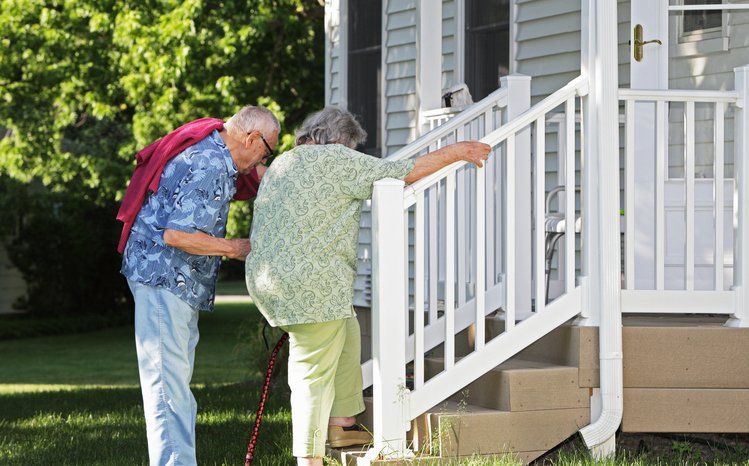Each year, nearly 1 million people over age 65 are treated in hospital emergency rooms for injuries associated with the products they live with and use every day, according to estimates by the U.S. Consumer Product Safety Commission. Many of these injuries result from hazards that are easy to overlook — but also easy to fix. With a little advance care planning, you can make sure you and your loved one are aware of the potential dangers and prepare accordingly. Here’s a look at four ways you can make home safer for your aging parents.
Prevent Falls
Falls are the leading cause of fatal and non-fatal injuries for older Americans, yet most of them can be prevented. Check all lamp, extension, and telephone cords around the house. Cords stretched across walkways may cause someone to trip. Arrange furniture so that outlets are available for lamps and appliances without the use of extension cords. Also, check all rugs, runners, and mats, which are often the cause of trips. Remove rugs and runners that tend to slide, or apply slip-resistant backing or place rubber matting under rugs. If your loved one has difficulty with walking or balance or has fallen in the past year, talk to their health care provider about having a special falls risk assessment.
Protect Against Fire
Older adults have an increased risk of dying in a fire, according to the U.S. Fire Administration. Many fire injuries and deaths in homes are caused by smoke and toxic gases, rather than the fire itself. Smoke detectors provide an early warning and can wake your loved one in the event of a fire, so purchase a smoke detector if they don’t have one, and check and replace batteries twice a year. Space heaters can cause fires or serious burns if they cause your loved one to trip or if they are knocked over. Make sure heaters are at least 3 feet away from anything that can burn, such as curtains, bedding, or furniture, and make sure your loved one turns them off when they leave the room. Also, encourage your loved ones to roll back long, loose sleeves or wear short sleeves when cooking, as long sleeves are more likely to catch fire than are short sleeves.
Avoid Bathroom Hazards
According to the Centers for Disease Control and Prevention, every year about 235,000 people over age 15 visit emergency rooms because of injuries suffered in the bathroom, and almost 14% are hospitalized. Not only are wet, soapy tile and porcelain surfaces especially slippery, but also water temperature above 120º F can cause scalding. Have grab bars installed in the shower and near the toilet to make getting around easier and safer, and put rubber mats in the bathtub to prevent slipping. Encourage your loved one to always check the water temperature by hand before entering the bath or shower.
Prevent Medication Mistakes
Medications that aren’t clearly and accurately labeled can be easily mixed up. Taking the wrong medicine, or missing a dosage of medicine you need can be dangerous. Be sure that all of your loved one’s medicines are stored in their original containers and that they are clearly marked with the contents, doctor’s instructions, and expiration date.
Helpful Tip: If your loved one struggles with small print, ask your pharmacist to put large-print labels on their medications to make them easier to read.
Always remember that no matter how organized you are, the plan will have to change as you go along — and that’s OK. Having the conversation in the first place — and understanding the needs, wishes, and dreams behind it — will help ensure a meaningful and caring future for you and those you love. Next time you’re at your parents’ home, consider conducting a home safety assessment to evaluate their level of home safety and gauge their general sense of well-being. For more tips on how to assess your loved one’s situation, make changes to unsafe areas in the home, and prepare for a sudden emergency, download “Getting Your Affairs in Order”.

